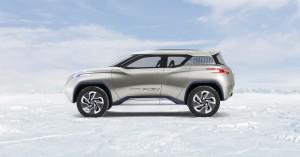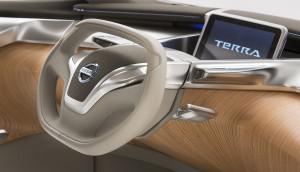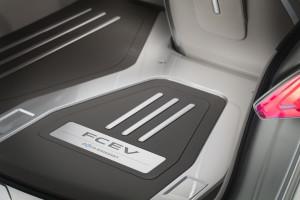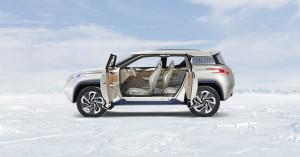The Nissan TeRRA SUV concept, to be unveiled at the 2012 Paris Motor Show on Sep 27, combines two outstanding Nissan strengths – SUVs and EVs – in a vehicle that is equally in its element off-road in the wild or gliding silently through a sophisticated urban setting. With an innovative 4×4 fuel-cell electric powertrain and an athletic exterior that projects an unforgettable presence beyond its compact dimensions, TeRRA takes sustainable motoring into exciting new territory.
Nissan’s TeRRA SUV concept takes sustainability off-road
- Nissan-developed fuel cell vehicle opens path to future zero-emission SUV featuring electric 3-motor AWD
- Compact SUV exterior design expresses athletic eco-appeal with “Modern Toughness” for off-road or in the city
- Unique seating layout and material fusion set a new paradigm in SUV category
- Portable instrument cluster creates seamless digital space

Envisioned as “the one and only Zero Emission SUV” TeRRA builds on Nissan’s success with urban-relevant SUVs and crossovers like Murano and Qashqai and asserts that its zero-emission expertise extends all the way to fuel cells.
Designed as a functional and flexible choice for tomorrow’s youthful, “always on” consumers, TeRRA answers their aspiration for eco-friendliness along with a secure driving feel under any road conditions.
“Our challenge was to take Nissan’s strength in SUVs and crossovers forward into the zero-emissions era, fuel cells being our new frontier in zero emission mobility” said Francois Bancon, Nissan’s devision general manager of product strategy and planning. “Not big and tough for the desert, the aim was a new approach to SUVs that’s relevant to urban life. The unique diagonal seating layout that offers an exciting driving experience thanks to exceptional visibility that creates a sense of being in control under any conditions.”


Open the door and exterior toughness gives way to a surprisingly warm and welcoming interior. The door panel is a sculpted fusion of blond wood trim and colored acrylic, layered in an intriguing pattern. Ringing the cabin at shoulder height is a metal frame that gives TeRRA’s occupants a feeling of security. The wood/metal contrast continues across the dashboard, a beechwood-acrylic fusion that exudes a soft warmth. On the driver’s side, the steering and instrument console gently tapers out toward the driver, barely interrupting the clean lines of the dash.
Seamless digital space…
Facing the driver is a unique instrument cluster. It’s an electronic tablet – just like today’s popular portable devices – that serves as an “intelligent key.” The driver docks it when entering the car and removes it when leaving. When docked in TeRRA, the tablet’s default view displays speed and other key performance indicators. But the driver can easily toggle to entertainment, communications, navigation and other views. Outside the car it provides all the functions we expect from a tablet, plus it stays continually in touch with the vehicle.The idea is seamless information and communication, on the road and everywhere else.
Power, four-by-four; emissions, zero
Although TeRRA is presented as a design concept, not a technical exhibit, its proposed 4×4 fuel cell electric powertrain is far from imaginary.
Powering the front wheels is the electric propulsion system currently featured in the Nissan LEAF. In each back wheel, providing all-wheel power as needed, is an in-wheel electric motor, based on the working prototypes featured in three successive PIVO concepts. As no drive shafts are required to power the rear wheels, there is no hump in the cabin floor or on the underbody. This allows for the flat cabin deck and the underside body pan.
Under the hood is ample space for Nissan’s proprietary hydrogen fuel cell stack: a flat, highly compact unit that features world-leading power density of 2.5kW/L. The latest in a series of Nissan fuel cells since 1996, the stack costs just one-sixth of its 2005 predecessor as the need for expensive precious metals has been slashed to one-quarter of the previous level.

TeRRA is purely a concept car, but it signals that Nissan is ready to mass-produce fuel cell electric vehicles whenever hydrogen becomes widely available.
[Note: Content Reproduced with permission]


